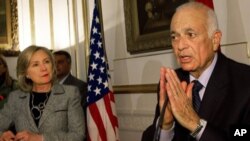U.S Secretary of State Hillary Clinton arrived in Egypt on Tuesday for talks with members of the country's new government as well as Egypt's emerging civil society. One of the key issues on Clinton's agenda is economic aid.
Secretary of State Clinton came with words of encouragement and praise for the people of Egypt. "This moment of history belongs to you. That this is your achievement. You broke barriers and overcame obstacles to pursue the dream of democracy. And the United States and President Obama and I will stand with you as you make this journey," she said.
To help that journey along, Clinton promised financial as well as political support. After meeting her Egyptian counterpart Nabil Elaraby, she announced a series of aid packages: $90 million in near-term economic assistance; $80 million toward insuring letters of credit, plus a new U.S.-Egypt Enterprise Fund and an increase in special duty-free investment zones.
Clinton is the highest ranking Obama administration official to visit Egypt since demonstrations forced out the previous government last month.
Egypt's new Foreign Minister Elaraby said he welcomed the chance to discuss a wide range of issues with the U.S. secretary of state. "We discussed everything in Egypt, in the Middle East in general, specifically in Libya. We discussed matters relating to Palestine between us also. And I think we did, at least on our part, we appreciated very much the responses from the Secretary of State. We are appreciative and we hope the very close relations with the United States will continue to flourish in the future," he said.
The events in neighboring Libya have overshadowed much of Clinton's tour, which began in Paris on Monday and continues on to Tunisia on Wednesday. Clinton made reference to continued discussions about a possible no-fly zone over Libya to protect opponents of Libyan leader Moammar Gadhafi, even as the time for such cover to be effective might be slipping away. She also called for restraint on all sides in Bahrain, where Saudi-led forces came to the aid of the ruling family this week.
A State Department official said Clinton conveyed her deep concern about the violence in Bahrain in a telephone conversation with Saudi Foreign Minister Prince Saud earlier in the day. In addition to meetings with government officials, Clinton is set to meet with representatives of the activists behind Egypt's demonstrations and their advisors on Tuesday and Wednesday.
One of those advisors, Hisham Kassem, welcomed the idea of U.S. financial assistance to Egypt. But he said he would like to see it tied to political reforms in Cairo. "If this was to be in packages where there are free elections, 20 percent of the debt is taken off. Security sector reform? You take off another. Judicial reform, etc, until you know there is the possibility to scratch the debts completely," he said.
While Kassem said he is looking forward to speaking with Clinton, some youth groups rejected the invitation to meet with the U.S. diplomat. They pointed to the initial reluctance of the United States to back their movement and a perceived hesitancy in U.S. policy toward other reform movements in the Arab world.
Clinton Promises Support, Money to New Egyptian Government














